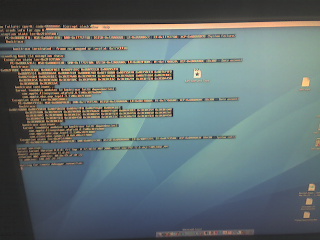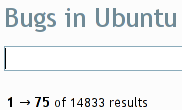A Return to Linux 15 years, 4 months ago by Martey Dodoo
About a year ago, I bought a MacBook and began using OS X as my primary operating system. While I still believe that I had valid reasons for doing so, time has proved that those reasons were not as important as I had assumed them to be.

Last December, I wrote:
While I fully realize that using OS X is not going to be all ponies and rainbows, I am hopeful that it will provide me with a decent experience and help me accomplish more.Unfortunately, this has not happened.
I was disappointed to find that despite Apple's jabs at Microsoft for being slow to release derivative and non-innovative features, OS X development does not move very quickly. This is both a bit unreasonable and a result of having been spoiled by Linux and its rapid pace of development.1 The idea of having to wait until 2009 or 2010 for OS X 10.6 or Windows 7 to come out in order to have new features seems silly.
Of course, the reason that Microsoft and Apple do not release new features willy-nilly is because they do not want to break third-party programs with relatively minor updates.2Apple would like you to believe that their operating system is more stable than Windows. From their Get a Mac Frequently Asked Questions:

*Is a Mac reliable?* When you buy a PC, you’re buying hardware from one company and an operating system and software from other companies. Not so with a Mac. Because Apple builds both the computer and the software that comes with it, they’re literally made for each other. This means that a Mac rarely freezes or crashes. Occasionally an application might quit, but it won’t affect the rest of your system. And Mac OS X resists most viruses, so you can do anything — without worrying about losing everything.
Ironically, Mac OS X 10.5 has been the most consistently unstable operating system that I have the opportunity to use in my life. At least once a month, I would receive a kernel panic. While the vast majority of these were related to third-party programs (and therefore not completely Apple's fault), they were not caused by small freeware or open source programs, but by flagship software like Microsoft Office 2008, Parallels Desktop, and The Missing Sync.
Even more infuriating were the random system crashes. Sometimes the computer would not come back from sleep.3 Other times, the machine would slowly come to a halt, with the mouse cursor moving but nothing responding. Despite OS X's Unix foundation, the system logs were always completely empty, making it nigh impossible to troubleshoot.

One of the nice things about using Linux was the ability to feel like you had the ability to change things for the better. If you saw an issue, you could write a bug report about it, which help find a workaround or code that would fix the issue.
OS X is not like this. Either everyone has the same issue and does not want to hear you complain, or it seems like nobody else is running into the issue. The latter condition is exacerbated by Apple's lack of an public bug tracking system, which robs its users of having a centralized place where issues and problems are documented.
This past year has made it clear that OS X and I are not compatible enough for me to continue using it as my primary operating system. While I will miss Time Machine, Address Book, and several other OS X applications that have no true analogue in other operating systems, I am looking forward to spending 2009 with Linux.
-
Ubuntu and Gnome both release new versions once every 6 months. The Linux kernel has released 4 significant versions so far this year (2.6.24 was released in January; 2.6.28 was released yesterday, December 24th). ↩
-
The assumption is that if minor updates break programs that computer users depend upon, they will be more hesitant to install critical security updates.
I personally believe that the main reason that so many people dislike Windows Vista is because of multiple early issues with device drivers and other pieces of poorly written software that were falsely branded "Vista compatible." ↩
-
Gentle reader, please note that this is one of the issues that I assumed would end once I stopped using Linux. ↩